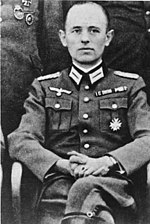About Reinhard Gehlen
- Reinhard Gehlen (3 April 1902 – 8 June 1979) was a German lieutenant-general and intelligence officer.
- He was chief of the Wehrmacht Foreign Armies East military intelligence service on the eastern front during World War II, spymaster of the CIA-affiliated anti-Communist Gehlen Organisation (1946–56) and the founding president of the Federal Intelligence Service (Bundesnachrichtendienst, BND) of West Germany (1956–68) during the Cold War.
- Gehlen became a professional soldier in 1920 during the Weimar Republic.
- In 1942, he became chief of FHO, the German Army's military intelligence unit on the Eastern Front (1941–45).
- He achieved the rank of major general before being fired by Adolf Hitler because of the FHO’s "defeatism", the pessimistic intelligence reports about Red Army superiority.In late 1945, at the start of the Cold War, the U.S.
- military (G-2 Intelligence) recruited him to establish the Gehlen Organisation, an espionage network against the Soviet Union, which employed former military officers of the Wehrmacht and former intelligence officers of the Schutzstaffel (SS) and the Sicherheitsdienst (SD).
- As head of the Gehlen Organization Gehlen sought cooperation with the Central Intelligence Agency (CIA) which was formed in 1947, and the Gehlen Organization eventually became a close affiliate of the CIA. Gehlen was instrumental in the negotiations to establish an official West German intelligence service on the basis of Gehlen Organization from the early 1950s.
- In 1956, the Gehlen Organization was transferred to the West German government and formed the core of the Federal Intelligence Service, the Federal Republic of Germany's official foreign intelligence service, and Gehlen served as its first president until his retirement in 1968.
- While this was a civilian office, he was also a lieutenant-general in the Reserve forces of the Bundeswehr, the highest-ranking reserve-officer in the military of West Germany.
- He received the Grand Cross of the Order of Merit of the Federal Republic of Germany in 1968.
Read more at Wikipedia
See Also
- Famous People's Birthdays on 03 April, Germany
- Famous People's Birthdays in April, Germany
- Famous military officer's Birthdays on 03 April, Germany
- Famous military officer's Birthdays in April, Germany
- Famous resistance fighter's Birthdays on 03 April, Germany
- Famous resistance fighter's Birthdays in April, Germany


 Date of Birth:
Date of Birth:  Place of Birth: Erfurt, Germany
Place of Birth: Erfurt, Germany
